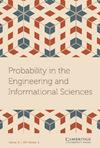带有2选择规则的偏见意见动态的相变
IF 1
3区 工程技术
Q4 ENGINEERING, INDUSTRIAL
Probability in the Engineering and Informational Sciences
Pub Date : 2022-08-25
DOI:10.1017/s0269964823000098
引用次数: 1
摘要
我们考虑了一个二元意见动态模型,其中一种意见本质上比另一种意见“优越”,社会代理人表现出对优越选择的“偏见”。具体地说,假设一个智能体以α > 0的概率更新其选择,而不考虑它当前的意见和其他智能体的意见。概率为$1-\alpha$,它在两个随机抽样的邻居和它自己之间采用多数意见。我们感兴趣的是网络在更好的替代方案上达成共识所需的时间。在大小为n的完整图中,我们表明,无论网络的初始配置如何,当偏差参数α足够高时,达到共识的平均时间为$\Theta(n\,\log n)$,即$\alpha \gt \alpha_c$,其中α c是唯一表征的阈值参数。当偏差较低时,即$\alpha \in (0,\alpha_c]$,我们表明,只有当具有优越意见的代理的初始比例高于一定阈值$p_c(\alpha)$时,才能实现相同的收敛速度。如果不是这样,那么我们表明网络平均需要$\Omega(\exp(\Theta(n)))$时间来达成共识。本文章由计算机程序翻译,如有差异,请以英文原文为准。
Phase transitions in biased opinion dynamics with 2-choices rule
We consider a model of binary opinion dynamics where one opinion is inherently “superior” than the other, and social agents exhibit a “bias” toward the superior alternative. Specifically, it is assumed that an agent updates its choice to the superior alternative with probability α > 0 irrespective of its current opinion and opinions of other agents. With probability
$1-\alpha$
, it adopts majority opinion among two randomly sampled neighbors and itself. We are interested in the time it takes for the network to converge to a consensus on the superior alternative. In a complete graph of size n, we show that irrespective of the initial configuration of the network, the average time to reach consensus scales as
$\Theta(n\,\log n)$
when the bias parameter α is sufficiently high, that is,
$\alpha \gt \alpha_c$
where α
c
is a threshold parameter that is uniquely characterized. When the bias is low, that is, when
$\alpha \in (0,\alpha_c]$
, we show that the same rate of convergence can only be achieved if the initial proportion of agents with the superior opinion is above certain threshold
$p_c(\alpha)$
. If this is not the case, then we show that the network takes
$\Omega(\exp(\Theta(n)))$
time on average to reach consensus.
求助全文
通过发布文献求助,成功后即可免费获取论文全文。
去求助
来源期刊
CiteScore
2.20
自引率
18.20%
发文量
45
审稿时长
>12 weeks
期刊介绍:
The primary focus of the journal is on stochastic modelling in the physical and engineering sciences, with particular emphasis on queueing theory, reliability theory, inventory theory, simulation, mathematical finance and probabilistic networks and graphs. Papers on analytic properties and related disciplines are also considered, as well as more general papers on applied and computational probability, if appropriate. Readers include academics working in statistics, operations research, computer science, engineering, management science and physical sciences as well as industrial practitioners engaged in telecommunications, computer science, financial engineering, operations research and management science.

 求助内容:
求助内容: 应助结果提醒方式:
应助结果提醒方式:


